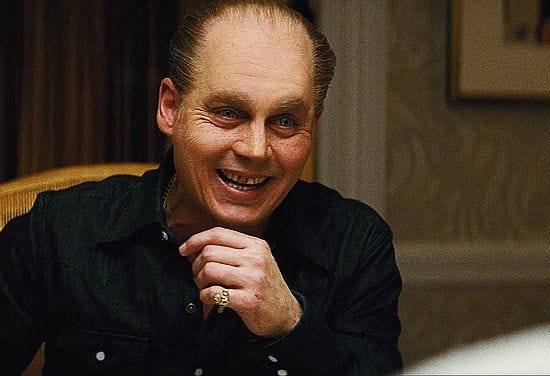Black Mass

Johnny Depp is expectedly magnificent in "Black Mass," the tale of Irish-American gangster Jimmy "Whitey" Bulger and the unholy alliance he forged with the FBI.
Icy stillness. Searing rage. Dead gaze. A man who exists almost as an energy form: pure malevolence and terror.
It's a terrifically commanding performance. I'm not certain it's a terribly complex one.
Depp holds our every attention every second he's on the screen, as we witness Jimmy's dark, violent saga over a 20-year period. What his character does not do is change one iota over the course of that span.
He arrives in 1975, fully formed and unspeakably evil. We leave him in 1995 without any notable alterations.
His circumstances do shift: initially a small-time hood fighting to control just his hardscrabble Southie neighborhood, Jimmy winds up as Boston's kingpin — with the unwitting (and witting) help of the local feds. Countless murders are attributed to him or his henchmen, the dank river bridge piles serving as his personal well-stocked graveyard.
He came, he saw, he buried.
The unnerving physical transformation is what first grabs our attention. With stabbing blue eyes, scant, slicked-back hair, corpse-like pallor and a dead tooth, Depp looks like he was dug up out of the ground 10 minutes ago and ensorceled back to rotting half-life.
He seems at once ancient and virile, strutting Mick bravado encased in a body that reflects the soul's irreversible decay. Notably, his appearance does not change as the other actors' faces thicken with increasing layers of age makeup.
Based on the book by Dick Lehr and Gerard O'Neill, "Black Mass" aims to be a sprawling gangster saga a la "Goodfellas," showing how absolute corruption seeps everywhere like an oil spill. The plot tends to wander, piling up secondary and tertiary characters, and compounding scenes of Jimmy facing down adversaries that begin to blur into each other.
Director Scott Cooper debuted with the amazing "Crazy Heart," then got caught in a family crime ramble with 2013's "Out of the Furnace." He seems to be a filmmaker who's a master at evoking vivid figures, but is less adroit at assembling a raft of characters and events into a coherent, compelling narrative.
Screenwriters Mark Mallouk and Jez Butterworth craft some great individual scenes, but the connective tissue has a Frankenstein feel. I wouldn't so much say that "Black Mass" is too long, but that it allocates its 122 minutes unwisely.
The focus of the story is, or should be, Jimmy's two decades as an informant for the FBI. He found a partner in agent John Connolly (Joel Edgerton), a fellow Southie who grew up idolizing Jimmy. Connolly offers to protect him if he'll feed information about fellow mobsters. Jimmy's reptilian mind immediately sees an opportunity to use the feds to take out the competition.
Since Jimmy was notoriously vicious toward "rats" in his own organization, this would seem a ripe area for exploration — how he justified in his own mind the act of informing on other criminals.
But this movie does not get into those sorts of interior monologues. "Black Mass" witnesses Jimmy Bulger only at external angles.
The supporting cast is bulging with talent and, well, just bulging. The sheer number of names and faces to keep track of is overwhelming at times.
Dakota Johnson and Julianne Nicholson play the long-suffering significant others of Jimmy and John, respectively, given little to do but cry and kvetch. David Harbour is John's tainted wingman. Kevin Bacon and Adam Scott are skeptical FBI honchos who crave the intelligence Jimmy provides but suspect they're being played.
Jesse Plemons, Rory Cochrane and W. Earl Brown play Jimmy's core crew, whom we first meet as aged turncoats giving testimony against him. Corey Stoll is the upstanding new prosecutor who finally starts to ask questions about the Jimmy/FBI arrangement. Juno Temple is a wide-eyed streetwalker who shows up just in time to leave. Peter Sarsgaard turns up as a twitchy accomplice who practically seems to have the mark of doom etched on his forehead.
Most ill-used is Benedict Cumberbatch as Jimmy's brother Billy Bulger, a state senator and political power player who somehow managed to maintain a close relationship with his mobster sibling while (the film would have us believe) staying completely and deliberately oblivious of his business.
All these people waltz in and out of the frame, wah-wahing through Boston accents that seem lacquered on like all the dark wood constantly occupying the movie's backgrounds. Each actor has a scene or two to establish their character's bona fides, then dissolves into the other furnishings.
"Black Mass" was built as a movie to feature Johnny Depp in a dominating, unforgettable performance. At this it succeeds, but to the detriment of the total cinematic experience.

